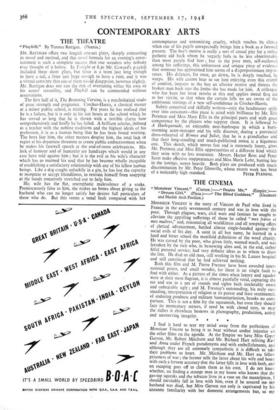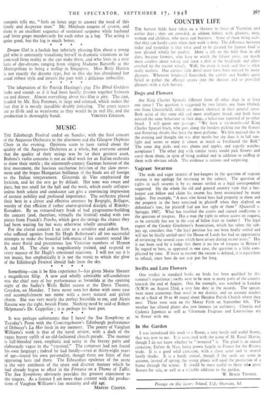THE CINEMA
MONSIEUR VINCENT is the story of Vincent de Paul who lived in France in the early seventeenth century and was in love with the poor. Through plagues, wars, civil wars and famines he sought to alleviate the appalling sufferings of those he called "mes freres et mes main-es," and, renouncing all worldliness and all tempting offers of clerical advancement, battled almost single-handed against the social evils of his day. A saint in all but name, he learned in a hard and bitter school the manifold definitions of the word charity. He was cursed by the poor, who given little, wanted much, and was forsaken by the rich who, in bestowing alms and, in the end, rather fitful personal service, had very definite ideas as to where to draw the line. He died an old man, still working in his St. Lazare hospital and still convinced that he had achieved nothing. Both this film and M. Pierre Fresnay have been awarded inter- national prizes, hnd small wonder, for there is no single fault to find with either. As a picture of the times when luxury and squalor were at their most flagrant, it is almost painfully vivid, capturing the ear and eye in a net of sounds and sights both intolerably sweet and unbearably ugly ; and M. Fresnay's outstanding, his truly out- standing, interpretation of religion at its purest and least sentimental, of enduring goodness and militant humanitarianism, brooks no com- parison. 'This is not a film for the squeamish, but even they should face its momentary terrors, if need be with closed eyes, to reap the riches it elsewhere bestows in photography, production, acting and unswerving integrity. * * * *
I find it hard to tear my mind away from the perfections of Monsieur Vincent to bring it to bear without undue injustice on the other films on the agenda. At the Empire we have Miss Greer Garson, Mr. Robert Mitchum and Mr. Richard Hart reliving Karl und Anna under French pseudonyms and with embellishments, and although they are all extremely sympathetic it is difficult to take their problems to heart. Mr. Mitchum and Mr. Hart are fellow prisoners of war ; the former tells the latter about his wife and home with such a fervent accuracy that the latter falls in love with both, and on escaping goes off to claim them as his own. I do not know whether, on finding a strange man in my house who knows that the gas-tap squeaks and the tobacco lives in a vase on the mantelpiece, I should inevitably fall in love with him, even if he assured me my husband was dead, but Miss Garson not only is captivated by his uncanny familiarity with her domestic arrangements but, so my
synopsis tells me, "feels an inner urge to answer the need of this lonely and desperate man." Mr. Mitchum returns of course, and there is an excellent sequence of sustained suspense while husband and River grope murderously for each other in a fog. The acting is quite good, but the fog is much better. * *
Dream Girl is a foolish but infinitely pleasing film about a young girl who is constantly visualising herself in dramatic situations as far removed from reality as she can make them, and who lives in a rosy haze of day-dreams ranging from singing Madame Butterfly at the Metropolitan to being a trollop in Singapore. Miss Betty Hutton is not exactly the dreamy type, but in this she has abandoned her usual robust style and invests the part with a delicious imbecility.
The 'adaptation of Sir Patrick Hastings's play The Blind Goddess looks and sounds as if it had been hastily thrown together between tea and dinner. Almost everything about this film is pity. The cast, headed by Mr. Eric Portman, is large and talented, which makes the fact that it is mostly inaudible doubly irritating. The court scenes
are as and as wearisome as they would be in real life, and the



































 Previous page
Previous page